The Working Brain
How Does The Brain Work?
Understanding Comes Before Treatment
“As a medical student, before you treat heart disease you learn about how the heart works. Before you treat kidney disease, you learn how the kidney works. The best therapies are based on an understanding of the biology of the system and the pathophysiology of the disease." Simply put, if we are to manage and cure neuropsychiatric disease, we must learn how the brain works. Kelsey Martin, the Dean of the School of Medicine, and a learning and memory researcher, has said.
Although, when we get to psychiatry, we don't understand the basic biology of emotion, cognition or those functions that go awry in so many psychiatric disorders so we can develop therapies that are rational and based on an understanding of brain biology. Extraordinary technical advances have provided neuroscientists with an expanded tool kit that allows researchers to uncover key information about genes, neurons and neural circuits, the building blocks of the working brain. The pace of research is staggering and UCLA is at the forefront of uncovering how the brain works and the underlying causes of brain dysfunction.
Important Contributions
Many UCLA scientists have made important contributions to understanding how the brain works, here are a few. Together these studies have established important principles of memory, depression, and uncovered the cellular and molecular networks underlying the brain's structure.

Peyman Golshani, MD, PhD A technique called optogenetics is providing Dr. Golshani and his colleagues with the ability to follow the activity of ensembles of neurons and now, not only to follow them, but to use light as surrogate for signals in the brain to determine how these neural circuits control behavior.

Dr. Hallem’s lab studies behavior by exposing worms to certain smells and determining whether they move toward or away from the source. By learning more about how parasites use olfaction to find their hosts, and how the parasitic brain transmits these signals, we can develop more effective treatments to combat these pathogens..

Dr. Silva and his colleagues are honing in on the parts of the brain responsible for source memories. Dr. Silva's work shows that memories are not stored in random neural circuits but are allocated to specific cells

The UCLA Depression Grand Challenge, led by Dr. Flint, explores the biological basis of depression with a 100,000-person study to identify genes linked to depression — the largest-ever genetic study for a single disorder.


